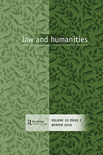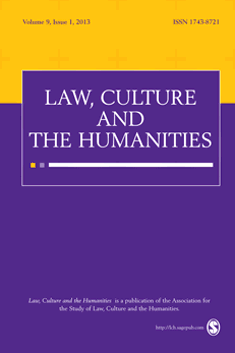
Law and Humanities
Scope & Guideline
Exploring the Nexus of Law and Culture
Introduction
Aims and Scopes
- Interdisciplinary Exploration:
The journal emphasizes the convergence of law and humanities, promoting research that draws connections between legal studies and various artistic and cultural expressions. - Historical Perspectives:
Many articles reflect on historical contexts, examining how past legal frameworks and societal norms influence contemporary legal thought and artistic representation. - Legal Narratives and Representation:
A consistent focus is on how narratives—whether in literature, film, or visual arts—represent legal themes, justice, and societal issues, thereby impacting public perception and understanding of law. - Cultural Critique:
The journal encourages critical analyses of legal systems through cultural lenses, addressing issues such as power dynamics, identity, and the role of art in societal critique. - Emerging Methodologies:
It explores innovative methodologies that incorporate artistic practices into legal studies, enhancing the understanding of law through creative expressions.
Trending and Emerging
- Art and Activism:
There is a growing interest in the intersection of art and activism, particularly how artistic practices can challenge legal norms and advocate for social justice, as seen in the exploration of women's activism in historical contexts. - Law and Technology:
Emerging discussions around the implications of technology on law—such as artificial intelligence and its potential to reshape legal frameworks—indicate a trend towards integrating contemporary technological issues into legal discourse. - Narratives of Marginalization:
An increased focus on marginalized voices and narratives, particularly in relation to race, gender, and colonial histories, reflects a broader societal movement towards inclusivity and recognition of diverse experiences within legal contexts. - Emotional and Affective Dimensions of Law:
The exploration of how emotions and affective experiences relate to law is becoming more prominent, indicating a shift towards understanding the human aspects of legal processes and their impact on individuals. - Environmental and Ecological Perspectives:
Recent works highlight the relationship between law, environment, and ecology, particularly in the context of the Anthropocene, suggesting a significant engagement with environmental justice and legal responses to climate change.
Declining or Waning
- Traditional Legal History:
There has been a noticeable decrease in papers purely focused on traditional legal history without the integration of contemporary cultural critiques or artistic interpretations. - Conventional Legal Theory:
Themes centered around conventional legal theories are becoming less frequent, as the journal shifts towards more interdisciplinary and innovative approaches that incorporate broader cultural and artistic contexts. - Static Representations of Law:
The journal seems to be moving away from static or overly simplistic representations of law in literature and art, favoring more dynamic and complex interpretations that engage with current societal issues.
Similar Journals

Veredas do Direito
Fostering insights that shape legal practice.Veredas do Direito is a prominent academic journal dedicated to the dynamic field of law, published by the esteemed Escola Superior Dom Helder Camara in Brazil. With its ISSN 1806-3845 and E-ISSN 2179-8699, this journal has established itself as an open-access platform since 2004, fostering a culture of knowledge dissemination and accessibility. It occupies a significant niche within the legal discourse, as reflected in its 2023 Scopus rankings, placing it in the 3rd quartile for Law and the 4th quartile for Management, Monitoring, Policy, and Law. The journal's scope is comprehensive, covering a wide array of legal issues relevant in contemporary society, and it significantly contributes to academics and practitioners by offering insights into effective management and legal policy. Scholars are encouraged to engage with this publication not only for its rigorous research but also for its commitment to advancing legal scholarship in Brazil and beyond, making it an indispensable resource for those committed to excellence in legal studies.

ARTMargins
Challenging narratives through critical dialogue.ARTMargins, published by MIT Press, stands at the intersection of cultural studies, history, and the visual and performing arts. Since its inception in 2012, this journal has provided a platform for critical dialogue and scholarly inquiry into contemporary art and its socio-political contexts, exploring the margins of artistic practice and representation. With a current Q3 ranking in Cultural Studies and History, and a Q2 ranking in Visual Arts and Performing Arts, ARTMargins is recognized for its impactful contributions to its fields, despite facing significant competition. The journal caters to academics, professionals, and students eager to delve into nuanced analyses and interdisciplinary approaches that challenge traditional narratives. As an essential resource for those studying art's role in society, ARTMargins fosters a deeper understanding of how culture shapes and is shaped by ephemeral artistic expressions. While the journal operates under a subscription model, it remains committed to accessibility and wide-reaching discourse within the academic community.

Comparative Legal History
Decoding Legal Traditions Through Historical Lenses.Comparative Legal History is a premier scholarly journal published by Routledge Journals, Taylor & Francis Ltd, dedicated to advancing the understanding of legal systems through the lens of historical analysis. With an impressive impact factor reflecting its academic rigor, this journal has established itself as a vital resource for researchers, professionals, and students alike who seek to explore the intersections of law and history. The journal is ranked in the Q1 category in History and Q2 in Law, demonstrating its quality and relevance in these fields. Covering a wide array of subjects related to comparative legal studies from its inception in 2013, the journal publishes original research, critical essays, and discussions on historical legal practices and their contemporary implications. Comparative Legal History provides a unique platform for interdisciplinary scholarship, contributing significantly to the academic discourse in both history and law, making it an essential publication for anyone involved in these disciplines.

Law Culture and the Humanities
Illuminating the Intersections of Law, Culture, and HumanityLaw Culture and the Humanities, published by SAGE Publications Ltd, serves as a pivotal forum for interdisciplinary dialogue at the intersection of law and the humanities. With an ISSN of 1743-8721 and an E-ISSN of 1743-9752, this esteemed journal has been contributing to scholarly discourse since its inception in 2005 and continues to do so until 2024. The journal carries a respectable impact factor showcased through its category rankings: Q3 in Arts and Humanities (miscellaneous), Q2 in Cultural Studies, and Q3 in Law. Its Scopus rankings reflect an impressive standing in the social sciences, particularly within Cultural Studies and Law, indicating that it is a fundamental resource for researchers and professionals aiming to explore the nuanced relationships between legal frameworks and cultural expressions. While not an Open Access journal, it offers substantial insights into contemporary debates, making it essential for academics and students engaged in the study of law's cultural dimensions.

Revista de Humanidades
Illuminating Diverse Perspectives in Arts and HumanitiesRevista de Humanidades, published by UNIV NACIONAL EDUCACION DISTANCIA in Spain, is a distinguished open-access journal that has proudly embraced the principles of accessibility and scholarly dissemination since 2010. With an ISSN of 1130-5029 and an E-ISSN of 2340-8995, this journal caters to a broad spectrum of topics within the arts and humanities, fostering academic dialogue and knowledge sharing. It achieved a Q3 ranking in the Arts and Humanities (Miscellaneous) category for 2023, placing it in the 52nd percentile among its peers, highlighting its commitment to quality research and scholarly excellence. Researchers, professionals, and students can access its rich repository of articles and studies that span various disciplines within the humanities. With a clear focus on promoting interdisciplinary approaches and critical thought, Revista de Humanidades serves as an essential platform for emerging and established scholars alike, contributing to the ongoing evolution of the humanities field.

Grotiana
Connecting Past and Present in Legal StudiesGrotiana, a prestigious journal published by BRILL, stands as a vital resource for scholars and professionals engaged in the fields of History and Law. With its ISSN 0167-3831 and E-ISSN 1876-0759, this journal has been a beacon of academic inquiry since its inception, covering a diverse array of topics with an emphasis on legal history and historical jurisprudence. Grotiana holds a commendable impact within the academic community, reflected in its 2023 Scopus ranks indicating a 91st percentile in History and a 67th percentile in Law, underscoring its significance in interdisciplinary studies. Although not an open-access journal, it offers robust access options for institutions and individuals alike, facilitating research and knowledge dissemination. Scholars can benefit from its rich historical insights and rigorous legal analysis, contributing to the ongoing dialogue in these fields. With publishing cycles spanning from 1980 to 2024, Grotiana continues to uphold its commitment to excellence, making it a pivotal player for researchers, students, and professionals pursuing a deeper understanding of historical and legal frameworks.

Obradoiro de Historia Moderna
Connecting Scholars to the Rich Tapestry of Modern HistoryObradoiro de Historia Moderna is a prestigious academic journal dedicated to the field of modern history, published by the esteemed Universidade de Santiago de Compostela in Spain. With its ISSN 1133-0481 and E-ISSN 2340-0013, this journal has established itself as a vital resource for scholars in the humanities, achieving a remarkable Q1 ranking in History as of 2023, placing it in the top tier of academic publications in the field. Its Scopus rank of #226 out of 1760 positions it within the 87th percentile of Arts and Humanities journals, highlighting its impact and relevance. The journal is committed to advancing knowledge through rigorous peer-reviewed scholarship, focusing on a broad spectrum of subjects within modern history. Authors are encouraged to submit innovative research that contributes to the global discourse on historical methodologies and insights. With no open access model currently in place, each article published in Obradoiro de Historia Moderna represents a significant contribution to academic discourse, solidifying the journal's role as an essential platform for the exploration and dissemination of historical research.

ARS Orientalis
Bridging Tradition and Modernity in ScholarshipARS Orientalis is a distinguished academic journal published by the Smithsonian Institution's Freer Gallery of Art, specializing in the fields of archaeology, cultural studies, and the visual and performing arts. With an ISSN of 0571-1371, this journal contributes significantly to scholarly discourse, having established a robust timeline of publication since its inception, notably from 2001 to 2006, 2010 to 2012, 2014 to 2017, and resuming again from 2022 to 2023. Though currently not open access, it maintains a respectable standing in the academic community with a categorization into Q3 quartiles across several disciplines, highlighting its relevance amid rigorous scholarly evaluation. The journal is particularly valuable for researchers, professionals, and students who seek to explore interdisciplinary connections within its scope. Situated in the United States, it aims to disseminate insightful research that bridges the gap between traditional scholarship and contemporary studies in visual culture and archaeological findings.

Australian and New Zealand Journal of Art
Celebrating Diverse Artistic MethodologiesThe Australian and New Zealand Journal of Art, published by Taylor & Francis Ltd, stands as a critical platform for scholarly discourse in the fields of art, visual arts, and performing arts, contributing to the ongoing dialogue regarding contemporary artistic practices and methodologies across Australia and New Zealand. With an ISSN of 1443-4318 and an E-ISSN of 2203-1871, this journal invites submissions that strive for innovation and insightful critique, aiming to foster a deeper appreciation and understanding of diverse artistic expressions. Despite its classification in the fourth quartile under the Arts and Humanities categories, it continues to attract attention within its niche, as evidenced by its Scopus rankings, indicating its vital role in the academic landscape. The journal is committed to bridging the gap between research and practice, providing access to a wealth of interdisciplinary knowledge for researchers, professionals, and students alike.

Culture and Dialogue
Cultivating Conversations Across CulturesCulture and Dialogue is a prominent journal published by BRILL, dedicated to exploring the intricate relationships between culture, communication, and societal dynamics. With an ISSN of 2222-3282 and an E-ISSN of 2468-3949, this journal serves as a vital platform for disseminating research that bridges various academic disciplines, including cultural studies, anthropology, and communication theory. Positioned in the Netherlands, it benefits from BRILL's esteemed reputation in scholarly publishing, ensuring high visibility and accessibility within the academic community. The journal aims to foster a deeper understanding of cultural narratives and dialogues, highlighting their significance in contemporary society. As an invaluable resource for researchers, professionals, and students eager to engage with cutting-edge discussions, Culture and Dialogue contributes significantly to the advancement of knowledge in its field.